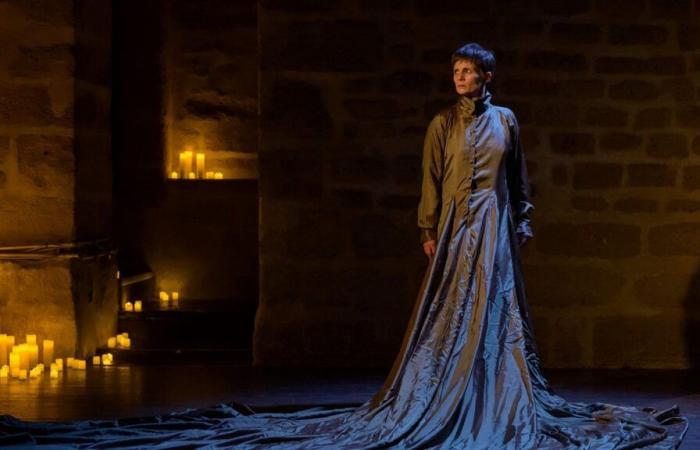On the bare stage, only the light skilfully dosed by Laurent Schneegans, with its small forest of flickering flames, defines the contours of the six adventures which will take shape. Guy-Pierre Couleau’s production places this rare moment in the setting of the medieval and historically vaulted cellars of the Essaïon theater, in the Parisian Marais district.
Alone on stage for an hour – but the time sometimes seems very short – Agathe Queljay delivers with a rare passion, a violent tenderness one could say, the poetry of Jehan-Rictus. Texts written at the beginning of the last century in a particular language, that of the poor people, subject to the absolute power of the big bourgeoisie, the employers and the police at their orders, in a climate of violence and fear.
Jehan-Rictus, born in 1867, real name Gabriel Randon, who fled the oppressive family home at just 17 years old, tried his hand at several professions, without much success. Before becoming a poet. Two essential works are known by him, “The soliloquies of the poor”, which narrate the setbacks of a homeless man in the streets of the capital. The cold, the hunger, the great moral, emotional and material misery are depicted without pretense. “Le coeur populaire” is the other collection, published in 1913. From it are taken the six texts of this show whose title is inevitably intriguing: “Nightingale with a rotten tongue”.
The poetry of simple and raw words
Here, poverty strikes from a very young age. When, for example, the father, filthy, comes home drunk after having drunk his week’s pay, knocks anyone who dares to upset him at home, before slipping a hand into the bed of his terrified little daughters. A little later, it is a young prostitute who, in “Charlotte prays to Our Lady during the night of New Year’s Eve”, implores “the Virgin Mary” to help her or to take her to heaven. A little further on, here is a mother who is praying in front of the mass grave in the Ivry cemetery. “You hear your poor mother/Your old lady, as you used to say in the old days” she said to her kid executed a year ago…
Jehan-Rictus’ writing does not bother with elegance. She is natural, raw, without makeup or powdered hairpiece. She is not the people, she is the people. Her style, explains Agathe Queljay, “has this ability to reconcile us with poetry and delights us with its simple and raw words”. The actress adds: “At a time when war is knocking on the door, when women and children are still mistreated, beaten, raped, bartered, murdered, the themes addressed are blatantly topical.”
With ease, as if transported by the fluidity of the staging underlined by a few moments borrowed from today’s musical times, the actress is all these characters. In an androgynous look which accentuates the universality of the subject. Even when she finally wears the astonishing dress designed by Delphone Capossela. The song of the nightingale is all the more universal, captivating and always true.
-Until April 1 at the Essaïon theater, rue Pierre au Lard Paris 4th, telephone: 01 42 78 46 42. Then tour and Off d’Avignon festival in July.
Closer to those who create
Humanity always claimed the idea that culture is not a commoditythat it is a condition of political life and human emancipation.
Faced with liberal cultural policies, which weaken the public service of culture, the newspaper reports on the resistance of creators and all cultural personnel, but also on the solidarity of the public.
Unusual, daring and unique positions are the hallmark of the newspaper’s culture pages. Our journalists explore behind the scenes of the world of culture and the genesis of the works who make and shake up the news.
Help us defend an ambitious idea of culture!
I want to know more!






